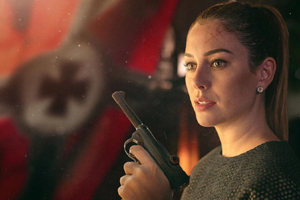 Welcome to Blanca Suárez Daily, your 24/7 online and leading source dedicated to Blanca Suárez since 2012. Known for El Internado, La Piel que Habito and El Barco, she will be star in Jaguar, El Cuarto Pasajero and Les Cinephiles shortly. Here you will find all you need to know about our idol including the largest picture gallery on the net, the latest news, videos and much more. Don’t forget you can also find BSD on Twitter. Make sure to follow us for all the new updates. I hope you enjoy your stay and come back soon!
Welcome to Blanca Suárez Daily, your 24/7 online and leading source dedicated to Blanca Suárez since 2012. Known for El Internado, La Piel que Habito and El Barco, she will be star in Jaguar, El Cuarto Pasajero and Les Cinephiles shortly. Here you will find all you need to know about our idol including the largest picture gallery on the net, the latest news, videos and much more. Don’t forget you can also find BSD on Twitter. Make sure to follow us for all the new updates. I hope you enjoy your stay and come back soon!Blanca Suárez, Óscar Casas, Iván Marcos, Adrián Lastra and Francesc Garrido take out their claws in the new Netflix series. It vindicates the Spanish victims of the Hitler delusion in the key of an action comic.
The Reichsadler, the imperial eagle of German heraldry, appropriated by Nazism in its symbolism, collapses on a hill and the blood accumulated in the concentration camps spills through the streets of Madrid. The header of the Jaguar series (now available on Netflix) begins with this brutal metaphor of how many faithful to Hitler found a safe corridor in Franco’s Spain to flee Europe after the fall of the Third Reich. All with an aesthetic of a graphic novel in the Maus style and to the sound of a great song by Ebri Knight, a Catalan folk punk group that vindicates in its lyrics the workers’ struggle and the republican cause. A wave that resonates in other scenes that portray this posh and lead sixties Madrid while playing, for example, Todo negro, the popular version that the band Los Salvajes made of Paint It Black, by The Rolling Stones, in 1966.
Until now, black was the memory of the Spaniards who, after taking refuge after the Civil War, ended up in Auschwitz, Mauthausen and other hells. “The story of those broken families that were lost and sold there, without a home to return to, either inside or outside Spain, has been told very little”, says Blanca Suárez about the relevance of this peripheral vision of the Holocaust.
She plays a survivor of those camps who becomes the linchpin of a kind of A-Team, and we’re already getting more into the realm of comics than historical memory, with five very different members united to hunt down those Nazis fleeing by the Spanish way. A plot similar to that of Hunters, the Al Pacino series (“I saw it before filming and it is very crazy and Tarantinian, but, although the theme is similar, in everything else they are very different”, clarifies Blanca), only that with a radically patriotic DNA.
The best example is the scene in which the leader of that team, played by Iván Marcos, draws the true heart of the Jaguar sitting in front of the painting of Goya’s Executions. “Recording at the Prado was something exceptional, a high point of the shoot”, recalls the actor. “The image and the words were closely related. Both refer to the Spanish resistance against the invading forces. The series is not based on real events nor is it a political pamphlet. It is an action thriller. But one of its great values is to remember the almost 10,000 Spaniards who were sent to concentration camps with the approval of Franco, and heroes like Cristino García, who fought with La Nueve to drive the Nazis out of Paris”.
That essence of action, the keyword shared by the five actors to define this Bambú Producciones project for Netflix, jumps from the Ritz hotel, the Piquer galleries and other iconic settings in the capital to Cabo de Gata, in Almería. In fact, Blanca Suárez and Iván Marcos film a vital trance for their characters on the Genovese beach, the same one in which Sean Connery and Harrison Ford shot down a plane with a clean gull, Nazi to be exact, in Indiana Jones and the last crusade.
Here the shootouts and explosions go from the sand to the sea, in a handful of fast-paced scenes with an engaging vintage execution. “I really like those sequences because there is risk, there is adrenaline… And because the specialists who help us are machines”, says an enthusiastic Óscar Casas, the youngest of the quintet.
His character is a collateral victim of Nazi barbarism and also of the castrating morality of that society: “He goes through life as if he were the king, with his hips thrown forward, that attitude to the James Dean but in tacky… more interesting is that he is a character ‘with a mask’, to whom things happen inside that he does not teach. I have explored toxic masculinity a lot, that reinforces how hetero he is due to insecurities or fears”.
In this tortuous path, he has the help of the most peculiar member of the group, another survivor of the camps whom they call Deaf but who is actually rather mute. “The first thing I thought is: ‘How do I do this?'” Says Adrián Lastra. “I’ve gotten into a pretty big eggplant, in fact Sordo changed a lot during the rehearsal process. My greatest fear was to find out how he spoke, but with a lot of personal study and help from professionals specialized in problems in the mouth, such as a cut tongue, I began to glimpse how he could communicate”.
The truth is that a gesture between his character and Óscar Casas’s is enough to give skin and truth to his bond. “I just had to know Oscar well and love him. It cost me little because he is a wonderful person and a super-generous actor, very much for the work of creating and playing”, says Adrián. Praise goes, praise comes. It is Oscar’s turn: “My brother Mario did know Adrián, but I didn’t have the pleasure… We connect very quickly, because we have the same humor and a very similar sensitivity. He was idyllic”.
Beyond revolvers, poison bottles and punctured telephones, the most powerful weapon in the series is to calibrate five actors as five bullets so that the whole is genuine, and with that flow that takes hold of them when they come together to pose before a camera. It was a risk, as Iván Marcos points out: “For example, Blanca and I are very different. But much. And our work processes are too. Well seen, it could have been a disaster. But it has been the opposite. Another point for the producer, Ramón Campos, who has a vision of the playing field that is not even normal”.
In this dance of double pairs, the fifth element is missing. The veteran. We take advantage of the fact that Francesc Garrido apparently embodies the voice of the group’s conscience to ask him what Jaguar is really about. Is it a revenge story? Fighting oblivion? “I think, above all, it is a series about justice. Which undoubtedly forces you to also do a memory exercise. And, although it plays to mix genres, at heart it is a classic story: some guys and a girl who look for the bad guys to do justice. The result is atomic”.
It is perhaps that conjugation of justice and oblivion that makes the series more topical. “They are universal concepts that we can extrapolate to the mild conflicts of our daily lives and that we also see in the news, in contexts of wars and major political issues”, reflects Blanca, who has worked in depth on post-traumatic stress and the life block that she suffers your character. “At first anger or fear predominates. Time has to pass for the dilemma between revenge and justice to come. When you go to sleep every night with your past, it is very frustrating to be told from the outside: “Get over it, turn the page”. Perhaps the advice we give is that acting hot does not ease the pain, going from behind with a gun does not end the nightmare. The only thing that can serve you and society is justice”, concludes the actress.
“Jaguar treats ordinary people as heroes who are capable of prevailing over their traumas and dedicating their lives to the fight against fascism”, concludes Iván: “Marvel and DC have to invent them. In our history we have examples of bone meat”. From a comic, really.




Source : esquire.com












